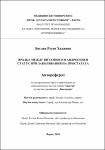I hereby declare that I will use the electronic library contents in compliance with COPYRIGHT AND RELATED RIGHTS ACT, Article 24, paragraph 1, item 9, only for scientific, cultural and educational purposes, without commercial gain, without commercial interest and non-profit.No Yes

Association between vitamin D and androgen status in prostate diseases /// Връзка между витамин D и андрогенен статус при заболявания на простатата

Date
2018Author
Roussev, Bogdan
Русев, Богдан
bogdan.hadjiev@mu-varna.bg
Metadata
Show full item recordAbstract
[EN] The aim of this thesis is to determine and compare the vitamin D and androgenic status in men with benign prostate diseases and prostate cancer and study the relationships between androgens and vitamin D with clinical and biochemical parameters evaluating the diseases. Clinical, histological, laboratory and statistical methods were used in the research for analysis and the process of the results. Adverse effect in vitamin D status was found in prostate cancer patients with significantly lower levels of calcidiol and bioavailable calcidiol compared to patients with benign prostate diseases (p<0.001 for calcidiol, p<0.05 for bioavailable calcidiol). Blood collection during the "warm" period indicates significantly higher serum concentrations of calcidiol in the two groups of patients. Prostate cancer patients almost reach the limit of 50 nmol/L, and patients with benign prostate disease are in the optimal range for vitamin D. For prostate cancer patients a decreasing trend of calcidiol and bioavailable calcitriol has been observed with an increased risk of bone metastasis, estimated by PSA over 20 ng/ml. Serum levels of calcidiol and bioavailable calcidiol were significantly lower in prostate cancer patients with high risk of biochemical recurrence. A negative correlation (Spearman r = - 0.21, p = 0.05 for calcidiol, and Spearman r = - 0.34, p = 0.01 for bioavailable were observed between with the risk of biochemical recurrence. Calcidiol levels were decreased in patients with more aggressive prostate cancer with a negative correlation between calcidiol and Gleason score (Spearman r = - 0.26, p <0.05). [BG] Да се направи сравнителен анализ на витамин D и андрогенен статус при пациенти с простатен карцином и пациенти с доброкачествени заболявания на простатата и да се проучат взаимовръзките между андрогени, витамин D и утвърдени клинични и биохимични параметри, характеризиращи тези заболявания. Методи: Бяха използвани клинични, хистологични, лабораторни и статистически методи при изследванията и обработването на резултатите. Установен е по-неблагоприятен витамин D статус при болните с простатен карцином, доказан чрез значимо по-ниските нива на калцидиол и бионаличен калцидиол в сравнение със стойностите на тези показатели при болните с доброкачествени заболявания на простатата (р<0,001 за калцидиол; р<0,05 за бионаличен калцидиол). През „топлия“ сезон на вземане на кръвта се установяват значимо по-високи серумни концентрации на калцидиол при двете групи пациенти. За карциномните пациенти те почти достигат граничната стойност от 50nmol/L, а за болните с доброкачествени заболявания – са в оптималния диапазон за витамин D. При пациентите с карцином на простатата се установява тенденция на понижение на калцидиол и бионаличен калцидиол с нарастване на риска от костни метастази, оценен чрез PSA над 20ng/ml. Серумните нива на калцидиол и бионаличен калцидиол са значимо понижени при карциномните пациенти с по-висок риск от биохимичен рецидив. Между нивата на циркулиращия витамин D, бионаличния калцидиол и риска от биохимичен рецидив се доказва негативна корелативна връзка (Spearman r = - 0,21, p = 0,05 за калцидиол; Spearman r = - 0,34, p = 0,01 за бионаличен калцидиол). Серумният калцидиол е понижен при пациентите с по-агресивен простатен карцином и е в обратна корелативна зависимост с оценката по Gleason (Spearman r = - 0.26, p <0.05).
